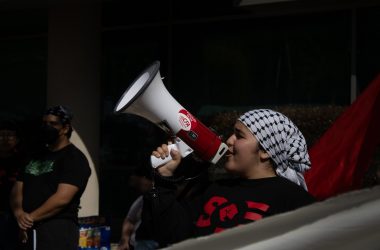You may have already heard whispers about Hollywood director Michael Mann’s anxiously awaited film to be released this summer starring Leonardo DiCaprio. The plotline: A former U.S. national security chief represents and acts in the interests of the Kingdom of Saudi Arabia.
The role of a rogue former FBI director will be played by Philip Seymour Hoffman. The role of the young, boyish-looking yet “wise beyond his years” U.S. Justice Department prosecutor will be played by DiCaprio. Hoffman’s edgy antagonistic wit is said to mesh well with Leo’s classic protagonist charm.
Sir Sean Connery — sporting his goatee and mustache — will emerge from the shadows to play the role of a Saudi prince under international investigation for involvement in government dealings with weapons and cash. Doesn’t this sound like a summer blockbuster?
I must confess, I have fabricated the aforementioned film project, however, a somewhat similar plot is unfolding in Washington, D.C.
Louis J. Freeh has an accomplished record for serving U.S. interests as its FBI director from 1993 to 2001. Freeh, now a lawyer in private practice, represents Prince Bandar bin Sultan, who was the Saudi ambassador to the United States from 1983 to 2005. Bandar is said to be so close to the Bush family that they jokingly refer to him as “Bandar Bush.”
Bandar is currently under U.S. investigation for a payment of $2 million that British arms manufacturer BAE transferred into U.S. bank accounts controlled by the prince as part of a Saudi arms-for-oil deal.
Freeh, who is serving as Bandar’s legal representation in the U.S., insists Bandar is innocent of any wrongdoing. He proclaims that the money transfer was not a bribe, but was instead a complex barter involving the exchange of Saudi oil for British fighter jets.
The British government halted its own investigation into the BAE contract in 2006. Official court memos about the case written by then-Prime Minister Tony Blair revealed a request to end the investigation, or face the Saudi’s threats to discontinue cooperation with the United Kingdom on counter-terrorism matters.
Clearly, there is sensitivity to the investigation. Saudi Arabia has been a close Middle Eastern ally of the U.S. and U.K. dating back to the 1930s.
That said, isn’t it strange that a former U.S. national security chief is representing a member of a foreign country under investigation in the U.S.?
As FBI chief for nearly a decade, Freeh had access to some of the most sensitive classified information on the globe. Can the knowledge of the inner-workings of the U.S. government not come into conflict during his representation of the prince? Where is the ethical line drawn between patriotism and law?
Renowned terrorism expert Richard Clarke has concerns about Freeh’s defense of Bandar.
“Someone who characterizes himself as a U.S. patriot and national security advocate ought not to be on the side of someone blackmailing people not to investigate crimes by threatening to withdraw a nation’s cooperation against terrorists,” Clarke said in a recent article in the Los Angeles Times.
The investigation involves oil, military weapons, cash, bribery and a Saudi prince nicknamed “Bandar Bush,” who is represented by Louis Freeh.
Hunter S. Thompson was right; they must think we are all rubes.
Hanif Zarrabi is a Middle Eastern history graduate student and a columnist for the Daily Forty-Niner.




@ jesus: Any person with a brain understands that as a private U.S. citizen, Mr. Freeh can rep whomever he wants. That is not the point of the article. This is an article about ethics and a potential conflict of interest.
Louis Freeh is now a private citizen, having retired from public service. He can represent whomever he wants in his private practice.